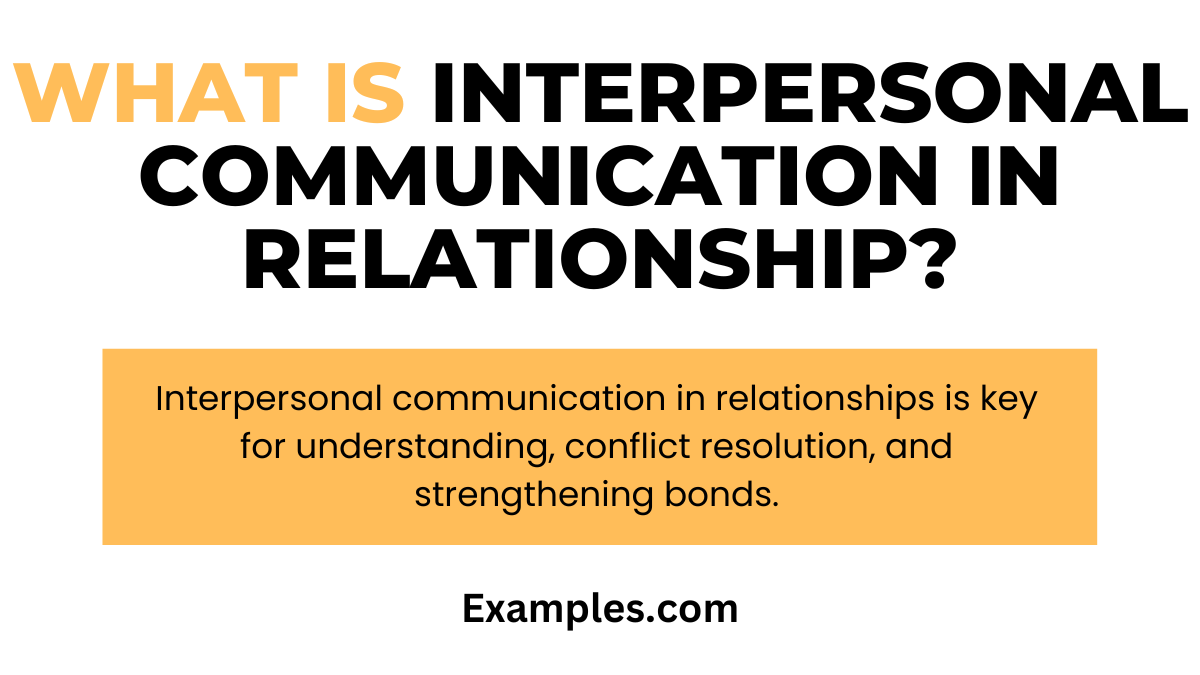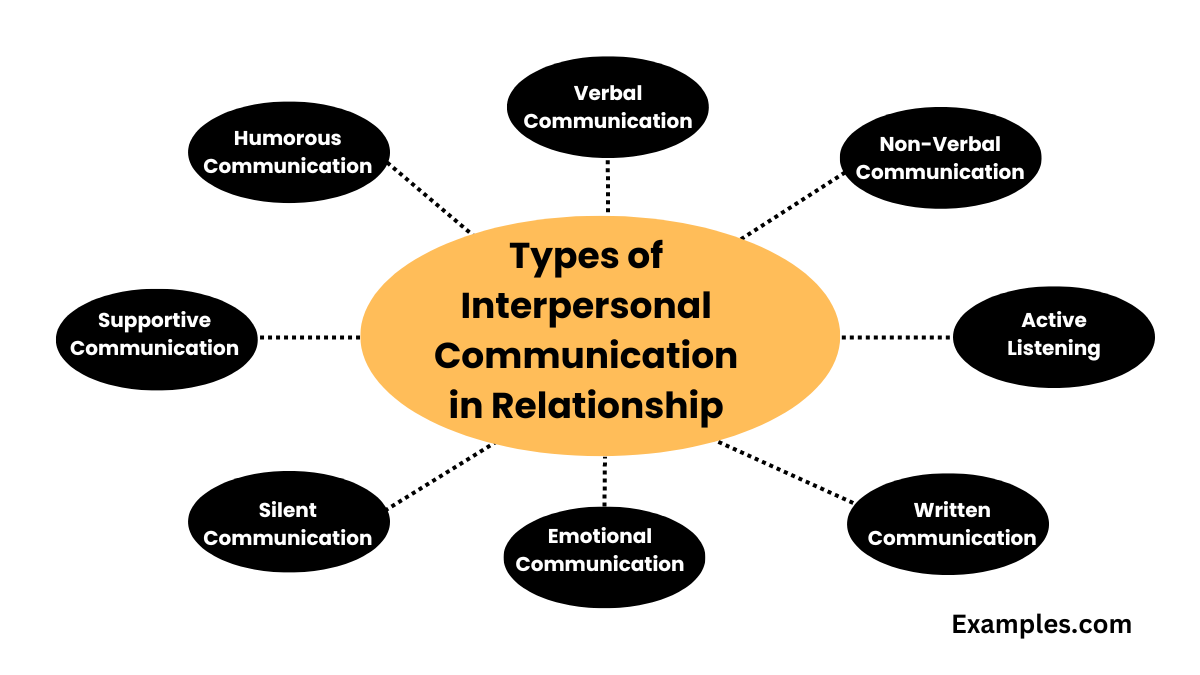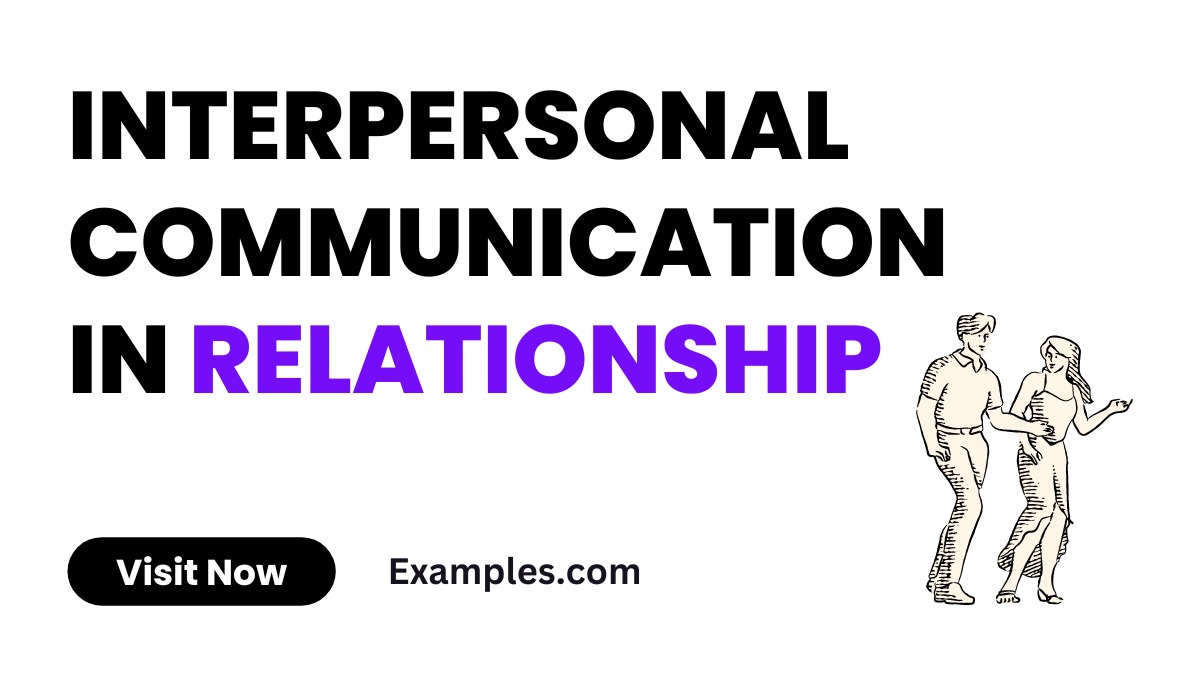9+ Interpersonal Communication in Relationship Examples
Interpersonal communication within relationships is the cornerstone of building and maintaining strong, healthy connections. It involves more than just oral communication; it encompasses understanding non-verbal cues, empathetic listening, and effective expression of thoughts and feelings. This communication is pivotal in establishing trust, resolving conflicts, and deepening emotional bonds. Mastering these skills is essential for nurturing a supportive and understanding environment in any relationship, be it romantic, familial, or platonic.
What is Interpersonal Communication in Relationship?

Interpersonal communication in relationships refers to the way individuals interact and convey messages to each other. It is not limited to verbal communication, but also includes non-verbal signals, emotional expressions, and listening skills. Effective interpersonal communication is key to understanding and being understood by one’s partner, promoting harmony, and building a stronger, more resilient bond. In relationships, this form of communication is crucial for navigating challenges, sharing joys, and creating a foundation of mutual respect and love.
Types of Interpersonal Communication in Relationship

The types of interpersonal communication in a relationship include verbal and non-verbal communication, active listening, and emotional expression. Each type serves a unique purpose; verbal communication is essential for conveying thoughts and information, while non-verbal communication helps express emotions and sentiments. Active listening ensures mutual understanding, and emotional expression deepens the emotional bond. Integrating these types effectively can lead to a more harmonious and fulfilling relationship.
- Verbal Communication: Directly speaking with your partner.
- Example: Discussing day-to-day activities and feelings.
- Non-Verbal Communication: Body language, facial expressions.
- Example: A reassuring hug or smile.
- Active Listening: Fully focusing on your partner when they speak.
- Example: Nodding and providing feedback during conversations.
- Written Communication: Sharing thoughts through written text.
- Example: Love notes or thoughtful texts.
- Emotional Communication: Expressing feelings and emotions.
- Example: Sharing fears and joys openly.
- Conflict Resolution Communication: Addressing and solving disagreements.
- Example: Calm discussions to resolve conflicts.
- Supportive Communication: Offering encouragement and empathy.
- Example: Comforting your partner during tough times.
- Assertive Communication: Expressing needs and boundaries clearly.
- Example: Stating personal needs respectfully.
- Humorous Communication: Lightening moments with humor.
- Example: Jokes to ease tension.
- Silent Communication: Communicating through actions, not words.
- Example: A thoughtful gesture like making coffee for your partner.
Role of Communication in Interpersonal Relationship
The role of communication in an interpersonal relationship is multifaceted. It serves as the primary tool for expressing emotions, sharing information, and resolving conflicts. Effective communication fosters mutual understanding and respect, essential for a healthy relationship. It also plays a crucial role in building trust, providing emotional support, and facilitating personal growth within the relationship. In short, communication is the thread that keeps the fabric of a relationship strong and intact.
- Building Trust: Honest conversations foster trust.
- Example: Sharing personal thoughts and vulnerabilities.
- Enhancing Understanding: Clear communication leads to better understanding.
- Example: Explaining personal viewpoints during discussions.
- Resolving Conflicts: Effective dialogue resolves misunderstandings.
- Example: Openly discussing and finding solutions to disagreements.
- Expressing Affection: Verbal and non-verbal cues show love.
- Example: Saying “I love you” or giving a warm hug.
- Sharing Information: Exchange of information for daily life.
- Example: Discussing plans and schedules.
- Providing Support: Emotional and psychological support through words.
- Example: Words of encouragement during challenges.
- Facilitating Growth: Promoting personal and relationship growth.
- Example: Constructive feedback for improvement.
- Enhancing Connection: Deepening the bond with meaningful conversations.
- Example: Sharing dreams and aspirations.
- Promoting Empathy: Understanding each other’s emotional states.
- Example: Acknowledging and responding to each other’s feelings.
- Setting Boundaries: Communicating limits and expectations.
- Example: Discussing personal space and boundaries.
Importance of Interpersonal Communication in Relationship
Interpersonal communication is vital in relationships as it forms the foundation for trust, understanding, and emotional connection. Effective communication allows partners to express their needs, share their thoughts and feelings, and resolve conflicts in a healthy manner. It also facilitates deeper empathy and understanding, helping partners to grow together and strengthen their bond. In essence, the quality of communication often determines the health and longevity of a relationship.
- Ensures Clarity: Reduces misunderstandings.
- Example: Clarifying a misinterpreted text message.
- Strengthens Bond: Regular communication strengthens the relationship.
- Example: Nightly conversations about your day.
- Promotes Empathy: Helps understand each other’s perspectives.
- Example: Listening to your partner’s work challenges.
- Facilitates Emotional Health: Supports emotional well-being.
- Example: Sharing feelings of anxiety or stress.
- Boosts Satisfaction: Enhances overall relationship satisfaction.
- Example: Regularly expressing appreciation for each other.
- Encourages Teamwork: Fosters a sense of partnership.
- Example: Planning a vacation together.
- Cultivates Respect: Mutual respect through thoughtful communication.
- Example: Respecting each other’s opinions during discussions.
- Aids in Problem-Solving: Finding solutions together.
- Example: Collaborating on household issues.
- Enhances Personal Development: Learning from each other.
- Example: Teaching each other new skills.
- Builds a Future Together: Planning and dreaming together.
- Example: Discussing long-term goals and aspirations.
Tips to Maintain an Interpersonal Communication in Relationship
Maintaining effective interpersonal communication in a relationship requires ongoing effort and mindfulness. Key tips include practicing active listening to truly understand your partner, expressing yourself clearly and honestly, and showing empathy towards their feelings. It’s also important to recognize and respect non-verbal cues, maintain open and regular communication, and address conflicts constructively. Cultivating these skills helps in nurturing a deeper, more fulfilling relationship.
- Practice Active Listening: Truly listen to your partner.
- Example: Summarize what your partner said to show understanding.
- Be Open and Honest: Share your true feelings.
- Example: Being honest about your emotions.
- Show Empathy: Understand your partner’s viewpoint.
- Example: Validating your partner’s feelings.
- Use “I” Statements: Communicate without blaming.
- Example: “I feel upset when…”
- Regular Check-Ins: Keep communication consistent.
- Example: Weekly date nights to talk.
- Appreciate and Compliment: Express gratitude and admiration.
- Example: Thanking your partner for small acts of kindness.
- Manage Conflicts Effectively: Address issues respectfully.
- Example: Avoiding harsh words during disagreements.
- Maintain Non-Verbal Connections: Use body language to show love.
- Example: Holding hands while walking.
- Stay Open-Minded: Respect differing opinions.
- Example: Considering your partner’s suggestions.
- Plan for Quality Time: Dedicate time for deep conversations.
- Example: Setting aside time away from distractions for discussions.
Interpersonal communication is the heart of successful relationships. This guide has provided essential tips and insights to enhance your communication skills. By practicing active listening, empathy, and effective expression, you can deepen connections, resolve conflicts, and nurture healthy relationships. Remember, open and honest communication is the key to fostering trust, understanding, and lasting bonds with your loved ones.



